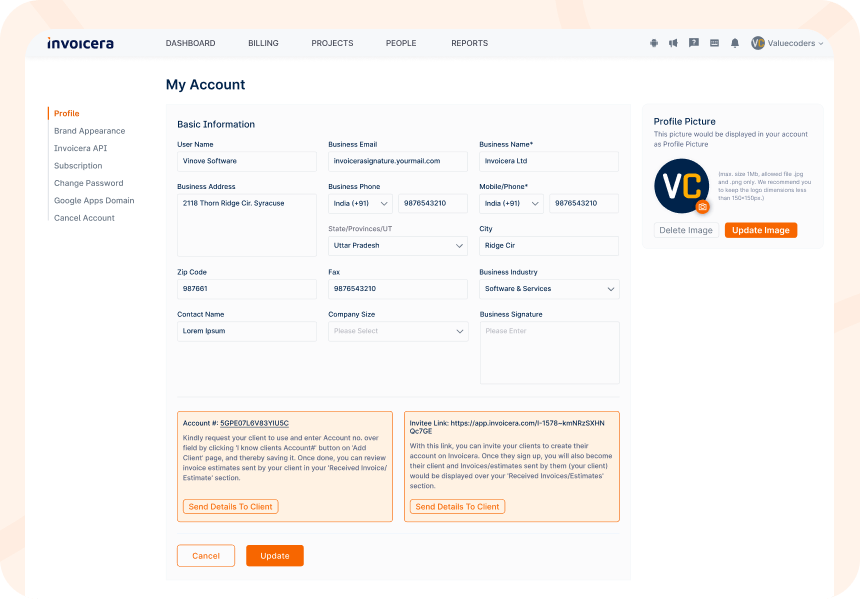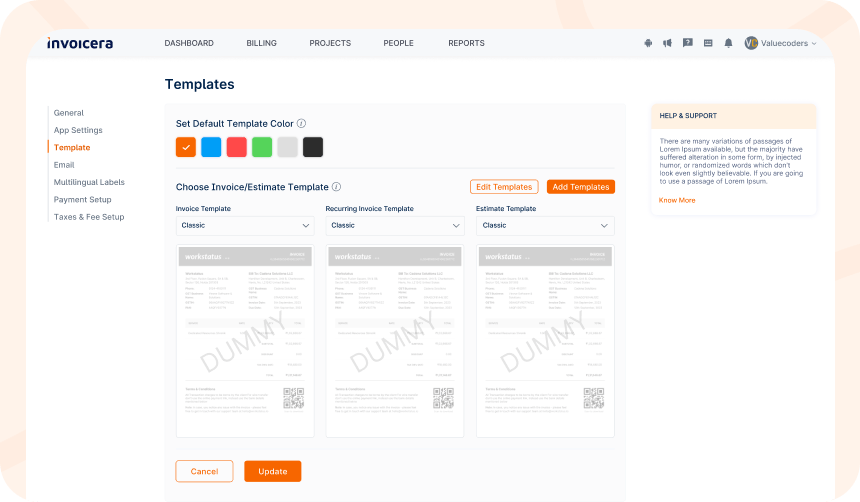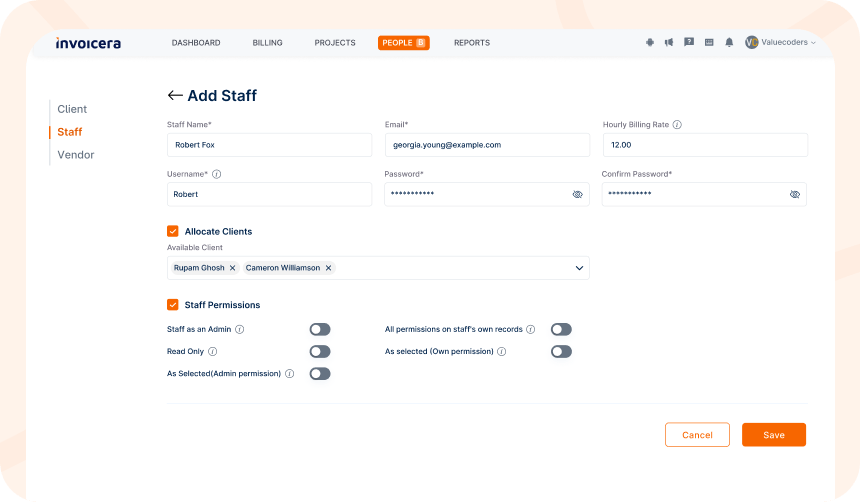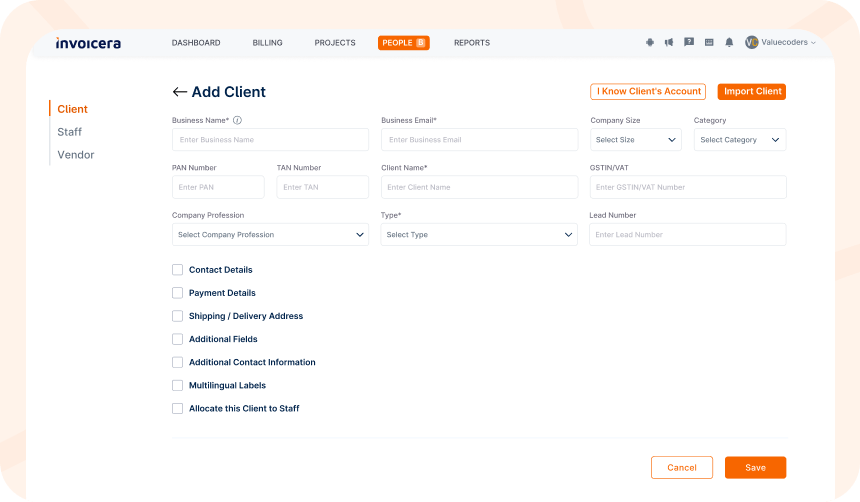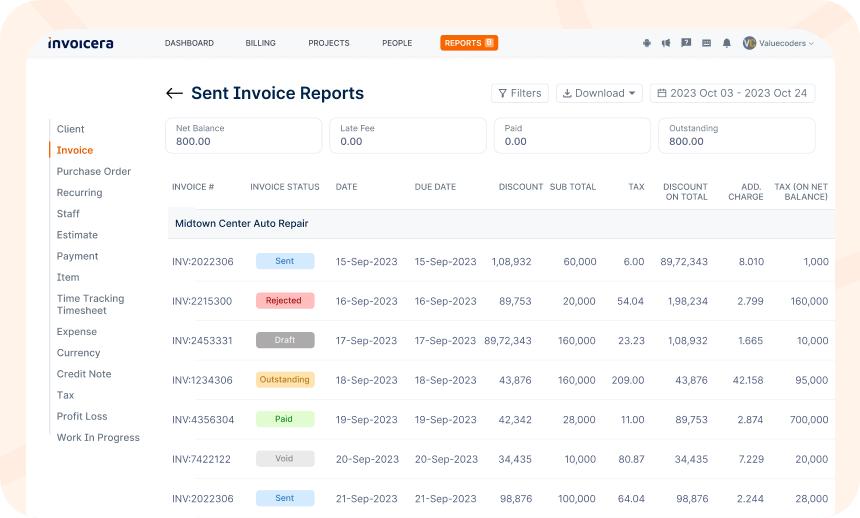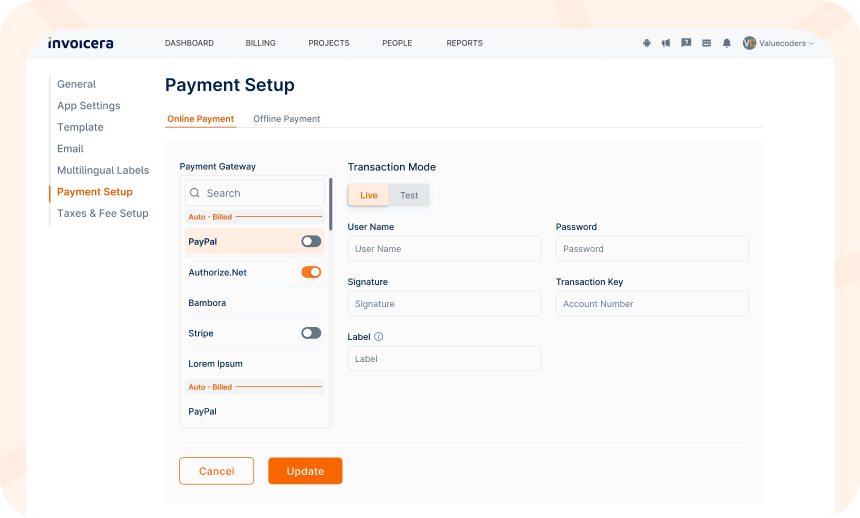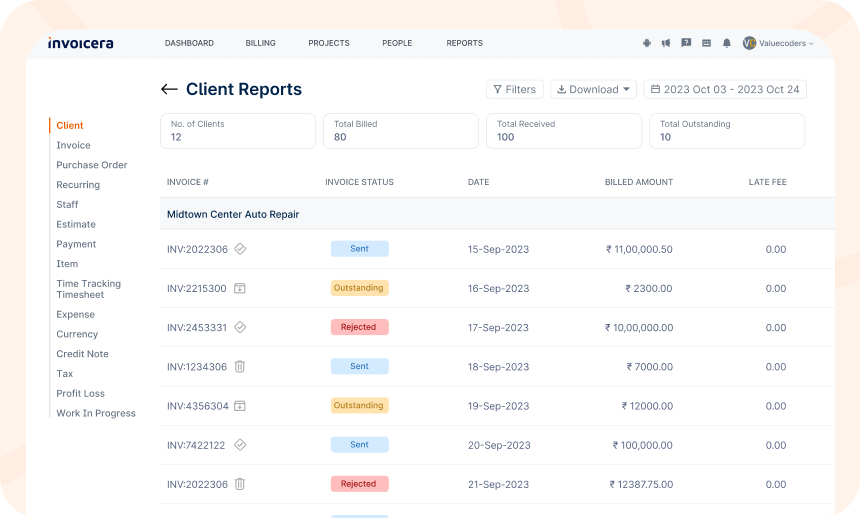Introduction
In the hectic world of law firms, keeping track of invoices effectively can frequently feel like sorting through a maze of details.
Fortunately, modern billing software has emerged as a beacon of relief in the often chaotic world of law firms. It has significantly reduced stress, increased accuracy, and made managing invoices a seamless experience.
Did You Know?
Most law firms adopting advanced billing software have witnessed a remarkable 40% increase in invoice processing efficiency.
This guide will examine how legal companies can use advanced billing software to improve invoicing processes.
Whether experienced or new, lawyers can improve their practice’s efficiency and profitability by effectively managing invoices. Explore how advanced billing software can transform your law firm’s invoicing processes.
Let’s get started!
Challenges In Invoice Management For Law Firms
Here are some common challenges faced by lawyers or attorneys related to invoice management for law firms:
1. Tracking Billable Hours Accurately
An essential task for law firms is keeping the hour record correct for each particular client and the associated cases. Attorneys and paralegals can have several cases at a time, which makes controlling time on every task hard. The manual time-recording methods are inaccurate and lead to the issue of incorrect billing, which harms the client’s trust and the company’s revenue.
2. Managing Complex Billing Structures
Legal firms frequently use complex billing methods, including hourly rates, flat fees, contingency, and retainers. Manually managing these complicated billing structures can be overwhelming and can lead to errors, which may lead to conflicts and, eventually, legal problems.
3. Ensuring Compliance with Billing Regulations
Legal practitioners regulate the bills they issue and comply with licensing bodies’ codes of conduct. Failure to meet these regulations can lead to major consequences, such as the institution of punishment or legal penalties. Handling each billing requirement manually and creating documents proving compliance is one of the substantial challenges.
4. Handling Multiple Currencies and Jurisdictions
Legal firms that serve clients in different jurisdictions and countries might be compelled to generate invoices in other countries, observe different tax laws, and follow different billing practices. These complexities can be a hassle to manage manually, and there is a higher chance of mistakes. Consequently, loss of revenues and client satisfaction could result.
5. Maintaining Detailed Records and Audit Trails
During billing and invoicing activities, law firms are expected to keep detailed records, among other things. Audit trails are also necessary. Manual data reporting is time-consuming and has a high chance of errors. Hence it becomes difficult to ensure that the audits or the disputes see the accurate information presented.
Furthermore, lawyers often juggle multiple responsibilities, including moonlighting work outside their primary legal practice. This additional workload adds complexity to their already demanding schedules, making it crucial for billing software to efficiently track billable hours across various endeavors. Advanced billing software not only helps manage the intricacies of legal billing but also accommodates the diverse tasks associated with moonlighting, ensuring accurate invoicing and comprehensive financial management for law firms.
The Role Of Advanced Billing Software
Advanced billing software transforms the standard charging model by automatically performing manual tasks and improving firms’ productivity. Here is what advanced billing software does:
1. Automated Billing Processes
AI-powered legal billing software automates time entry and thus minimizes mistakes that are possible in manual mode. Using an all-in-one legal software solution with practice management leads to the automatic capture of billable hours, jobs, and expenses so they are available for invoicing immediately.
2. Customizable Billing Templates
The advanced billing software offers customizable invoice templates tailored to the firm’s brand, colors, and client preferences. Personalized invoices reflect a professional feel and help maintain the law firm’s brand identity.
3. Expense Management
Billing software helps to ease expense management by offering tools to process and track clients’ billable expenses. Legal programs where accounting systems are implemented expeditiously manage expense reconciliation successfully and provide a reliable legal and financial management framework for law firms.
4. Billing Compliance
The software implementing modern legal billing is made to comply with professional legal standards and the requirements of the associations of legal practitioners. These compliance checks greatly reduce the risk of fraudulent coding or malpractice.
How Does Advanced Billing Software Streamline Invoice Generation?
Here’s how advanced billing software streamlines invoice generation for law firms:
1. Automation
The billing software is developed and implemented using an advanced automation framework. The process of invoice generation is completely automated. It helps to avoid saving the data into the sheets manually as it imports information from various sources like contracts, purchase orders as well and timesheets
2. Customization
These involve creating templates to generate invoices for the users and then allowing them to customize them to align with their brand and specific needs. You may choose your store’s logo and select the fonts and colors of the store as you desire.
3. Accuracy
The software guarantees precision when generating bills. It does calculations automatically, so human mistakes that occur during manual calculations are unlikely.
4. Integration
These software packs are the next suite generation and synchronize easily with other business applications like accounting software, CRM, and project management systems. This combination guarantees that all related records are always in sync, preventing the same data from being entered twice.
5. Tracking
Tracking invoices in real time is easier than managing them over a few days. This displays when an invoice was sent, read, and collected. It enables you to control payments and check the status of your clients’ payments, and if necessary, you can interfere with receiving timely payments.
6. Recurring Invoices
Billing automation allows for drafting consecutive invoices if clients have frequent service provisions or subscriptions. The only step is the establishment, which sometimes only needs to be done once. With it, the invoices will be generated once per various periods and then sent automatically, saving time and effort.
7. Compliance
These application solutions most often come with built-in compliance features that facilitate the creation of invoices that meet legal and regulatory obligations. The accounting services will include tax calculations, ensuring that you adhere to the billing regulations, and documenting your tax records properly.
8. Reporting
You can record bills and create a report of successful payments, unpaid balances, and bill delays. These insights are helpful for competent financial planning and making the best decisions.
Benefits Of Advanced Billing Software For Law Firms
Here are some prominent benefits of using advanced billing software for law firms:
1. Accurate Time Recording and Accounting
One of the main benefits of advanced billing software is that it can precisely track billable hours and expenses for each client and matter. Attorneys and paralegals have efficient means to record their time entries, which in turn, guarantee that every minute incurred is billed accurately. This is where under-billing or over-billing are avoided hence fostering trust and transparency.
2. Compliance and Audit Trail
Legal professionals must adhere to strict billing regulations and ethical standards as required by law. The compliance feature is usually one of the software’s advanced billing functions, which helps to comply with all the relevant laws and rules. Moreover, the tool keeps an exhaustive record of all the transactions, making auditing easier when such an audit is conducted or in case of any dispute.
3. Efficient Invoicing and Collection of Payments
Sophisticated billing software helps with automated invoicing, from creating professional invoices and sending reminders to accepting online payments. The consulting firm can settle the invoices faster and enhance its cash flow through this process.
4. Customizable Billing Structures
Many law firms adopt complicated fee structures involving hourly rates, fixed charges, success fees, and retainers. Law firms can use innovative billing software to set up customized billing that meets their specific demands. This results in accurate invoicing without any client misunderstandings or legal issues.
5. Reporting and Analytics
Apart from automated billing software, detailed reporting and analytics can enable law firms to gain valuable insights into billing and revenue patterns. This data-driven approach allows companies to find areas for improvement, optimize their billing processes, and make decisions based on data rather than mere assumptions.
Implementing Invoicera As An Advanced Billing Software For Success
Here is how you can implement Invoicera as an advanced billing software for your law firm’s success:
1. Account Setup
First, sign up for a free account on Invoicera’s platform. Provide basic details, including your firm’s name, address, and contact numbers.
2. Customization
Personalize your Invoicera account to reflect your law firm’s branding. Add your company logo, pick the colors and fonts representing your brand identity, and design invoice templates with all the applicable information, such as payment terms and customer data.
3. User Permissions
User permissions can be controlled in Invoicera to protect confidential data. To this end, give all employees, such as billing managers, lawyers, or supporting staff, roles, and permissions to carry out their functions obtained from within the company.
4. Client Onboarding
You can load existing client data from Invoicera into the platform or manually add clients. Provide the client’s contact details, billing options, and any specific billing arrangement or agreement.
5. Time Tracking
Employ Invoicera’s time-tracking functionality allows us to record billable client hours precisely. Submit time entries against specific clients and matters and classify them based on varying fee schematics or rates.
6. Expense Tracking
Track expenses made on behalf of clients using the Invoicera expense tracking module. Write down expenses such as filing of court, traveling, and other disbursements related to your clients for these to be reimbursed.
7. Invoicing Automation
In Invoicera, you can set up the automated invoicing workflow to automate your billing process. To avoid billing delays, set up recurring invoices for your clients with regular legal services, retain deals, and pre-fix invoice delivery dates.
8. Integration
Incorporate Invoicera with your current practice management software, accounting systems, and other office resources. The codes are linked, allowing for synchronized data and manual data entry.
9. Client Communication
Use Invoicera’s communication functions to talk to clients about billing inquiries, invoice notifications, or payment reminders. Client portals allow clients to access their invoices, payment history, and contact channels.
Factors To Consider When Choosing An Advanced Billing Software
Here are some key factors to consider when choosing the best-advanced billing software:
1. Features and Functionality
Search for software with extensive characteristics matching your business requirements, such as invoicing, time tracking, expense management, and reporting. Ensure the software gives customization options, e.g., branded invoice templates and flexible billing structures.
2. Ease of Use
Select software with an intuitive interface that is simple to navigate and operate. Even a person with little technical skills can manipulate it. When searching for the right invoicing software, check for features like drag-and-drop templates and simple reporting tools to make your billing process much easier.
3. Integration Capabilities
Choose software that can easily integrate with the existing business systems, including accounting software, customer relationship management (CRM) platforms, and project management tools. Verify if it is compatible with popular software packages to ensure hassle-free data exchange with workflow automation.
4. Scalability
Consider software that doesn’t stay the same: it may have the ability to include more customers, more operations, and more clients in the future. Research for scalable optional plans or customized solutions that provide optimum flexibility as your organization grows.
5. Security and Compliance
If the technology applies to your business, compliance with industry standards in data security and regulations should be prioritized. For example, software that abides by the GDPR or HIPAA rules is needed. Incorporate the software to provide features like secure payment processing, data encryption, and frequent system updates to fight security threats.
6. Cost and Pricing Structure
Consider the software’s costs, such as subscription fees, installation costs, and extra expenses for additional features or help desk services. By comparison, check out pricing plans from different vendors and pay attention to the scalability and ROI issues.
7. Cost and Pricing Structure
Assess the software’s price, comprising subscription fees, installation facility, and capacity to offer other features and support at an additional cost. While determining it, look into the pricing plans of various providers and consider return on investment (ROI) and scalability.
8. Customer Support and Training
Search for software providers that provide reactive customer support and a wide range of training resources like tutorials, documentation, and online forums. Assess the availability of aid channels like phone, email, or live chat, and check the vendor’s reputation for customer service.
9. User Reviews and Reputation
Consider customer evaluations and feedback from other companies to determine how the software works and how its users feel. Browse review websites, software peer review sites, and social media platforms for honest, unbiased opinions from actual clients.
10. Mobile Accessibility
The software that gives mobile accessibility is worth consideration. The availability makes it possible even when traveling by simply using your phone or tablet. You can develop flexibility and productivity with mobile apps like invoice creation, expense tracking, and real-time notifications.
11. Trial Period or Demo
Use trial periods or demos software vendors offer to fully comprehend the product before deciding. Take this opportunity to examine the software’s features, give your opinion on whether it would suit your business, and acquire feedback from your teammates.
Closing Thoughts
Efficient billing methods attorneys use are imperative for law firms’ long-term financial success and revenue maximization.
In today’s legal market, law firms can use advanced software solutions such as Invoicera to optimize their growth, efficiency, client satisfaction, and billing processes.
In conclusion, selecting the best-advanced billing software will improve productivity, simplify your billing procedures, and support the success of your company’s operations.
FAQs
Ques: Can the software handle different billing structures?
Ans: Yes, billing software like Invoicera can support several billing plans, such as hourly fees, fixed prices, and contingency ones, making it more useful for your company.
Ques: Is data security ensured when using the software?
Ans: Yes, the smart billing application ensures data security and may incorporate encryption protocols, secure payment processing, and regular updates to protect against unauthorized access.
Ques: How customizable are the invoice templates?
Ans: Normally, invoice templates can be highly personalized using billing software, including adding logos, choosing colors, and defining payment terms. This allows all invoices to align with your brand image and preferences.




